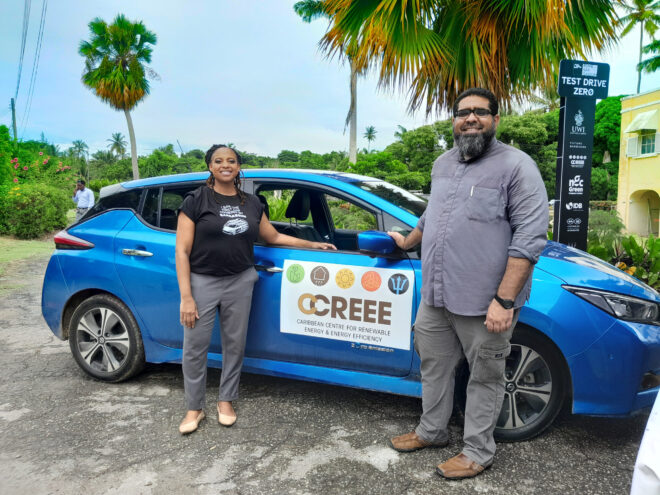Barbados Launches First Bio-CNG Vehicle Powered by Sargassum
Rum and Sargassum Inc., a local deep-tech start-up, and The University of the West Indies Cave Hill campus have launched the first vehicle powered by bio-compressed natural gas (CNG). The bio-CNG uses rum distillery wastewater and a sargassum-based biomethane, an innovative fuel source derived from the invasive seaweed which is plaguing the region’s coasts.
The seasonal issue posed by sargassum on the island’s beaches is now being turned into a valuable resource as the country seeks to achieve its goal of becoming a 100 per cent renewable energy and carbon-neutral island state by 2030. The project, spearheaded by Rum and Sargassum Inc., is an achievement for sustainable development in the Caribbean, thanks to partners like the Caribbean Centre for Renewable Energy and Energy Efficiency (CCREEE).
Dr. Legena Henry and her team from the Renewable Energy Development Laboratory at the Cave Hill Campus are the innovators of the biomethane fuel. Speaking during the launch of the vehicle, she said, “UWI Cave Hill Campus is really an incubator for creativity and innovation. Why I celebrate Cave Hill so much is because Barbados is a creative society, and we are leading the region right now in the energy transition.”
Additionally, she drew attention to the contributions from The CCREEE, stating that the regional body has been incredibly supportive of the project. Dr. Henry noted that the launch of the bio-CNG vehicle would not have been possible without The CCREEE, which offered the use of its electric car for the test drive. It is now the flagship vehicle bearing the slogan ‘Runs on Sargassum’.
Building on this success, Dr. Henry also outlined the next phase of the project, which involves establishing a biogas station. She said they currently have a small station at the Guinea Estate on four acres of agricultural land and described it as a perfect example of the circular nature of this process. She explained that “the digestate feeds the land, but the gas fuels cars,” creating a sustainable solution that benefits both agriculture and transportation.
In his remarks, Professor Clive Landis, Principal and Pro-Vice Chancellor of The UWI Cave Hill, praised Dr. Henry for embodying Cave Hill’s mission to “create value from ideas.” His comments came as he suggested that Dr. Henry’s work represents the next phase of The UWI’s strategy to evolve into an entrepreneurial university capable of leveraging research excellence to benefit society.
“Dr Henry is, firstly, leveraging her research on how to convert sargassum into biofuel to create value in society by tackling this pernicious environmental scourge,” Professor Landis stated, adding, “secondly, she is creating value for the university itself because the Cave Hill Campus is an equity partner in the venture. Taking an idea through the so-called tech transfer funnel, all the way from the point of conception to the successful pilot stage that we have witnessed today, the point at which it is ready for scale-up and investment, takes persistence and determination.”
Professor Landis hinted that the sargassum-powered vehicle is just the beginning. He said The UWI plans to introduce other sargassum-based innovations soon, including products for pest control and diabetes treatment.
Meanwhile, in her address, Senator Lisa Cummins, Minister of Energy and Business, lauded the project as a significant milestone in Barbados’ renewable energy journey. She underscored the fact that Barbados has 150,000 fossil fuel vehicles, and this innovation is important in the transportation sector as Barbados strives to meet its net-zero carbon emissions goals.
“Electrification and the use of renewables in transportation are critical for our energy transition,” Minister Cummins noted, adding that the project has the potential to “change the hearts and minds” of the Barbadian public regarding transitioning to renewable energy.
Minister Cummins also highlighted the broader potential of sargassum beyond Barbados, urging the region to embrace the opportunity. “This is a regional and a global first-mover opportunity. Barbados has pioneered a technology that can change the way the entire Caribbean treats to transportation, and I want us to not take that for granted,” she said, expressing confidence that Barbados will continue to lead in renewable energy.
The launch event was hosted by Rum and Sargassum Inc. and Supernova Lab of Future Barbados. Sponsors included The CCREEE, The UWI, NGC Green Company Limited, the National Petroleum Corporation, the Inter-American Development Bank, the Caribbean Climate-Smart Accelerator, TOSL Engineering Limited, and RL Mark & Company.
